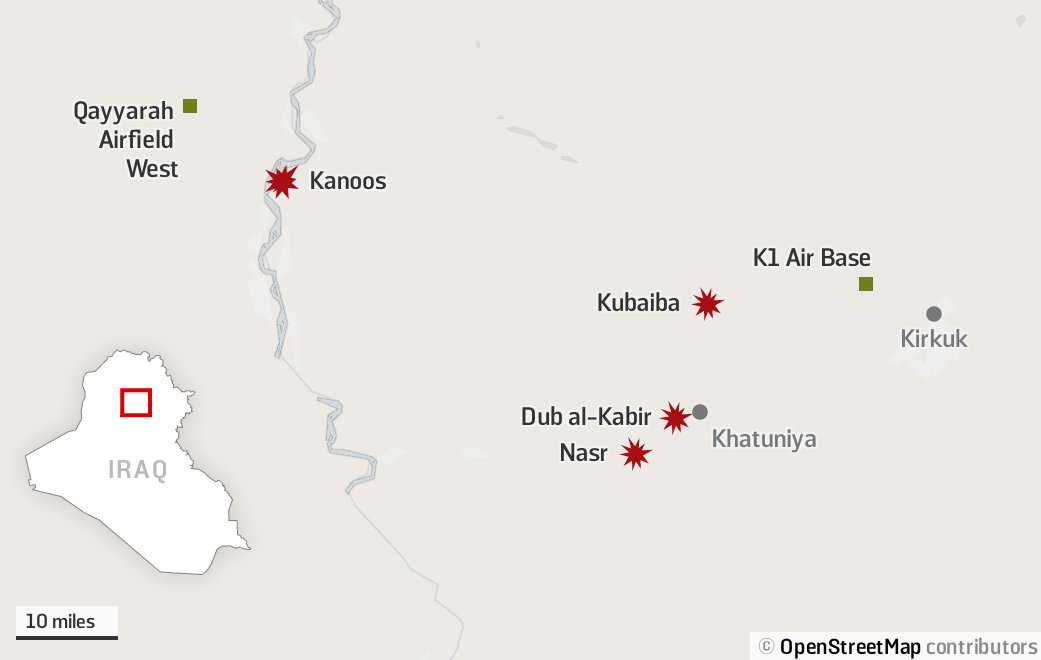My last piece of work from my freelance era, reported on and off over a period of a year for @ForeignPolicy in partnership @typeinvestigate, takes an in-depth look at the role of American special forces in anti-ISIS operations in #Iraq --> THREAD https://foreignpolicy.com/2020/05/29/how-tensions-between-the-u-s-and-iran-ended-up-strengthening-isis/">https://foreignpolicy.com/2020/05/2...
In late 2018 and early 2019, US special forces regularly accompanied their Iraqi partners on the ground, rather than just advising and assisting these missions, as often stated by the coalition.
American troops coordinated airstrikes, processed intelligence and—contrary to the coalition’s official position— engaged in combat. Two Iraqi officers said that during these joint missions, Iraqi and American soldiers moved together as “brothers in arms.”
The secrecy surrounding these raids is to some extent inherent in special operations. But the Americans’ low profile also points to the increasingly tenuous position of U.S. troops in Iraq ( @OIRspox is more vocal about “accompany” missions in Syria)
In Kirkuk province, several such missions occurred/month in late 2018/early 2019. No media were allowed to join. Usually, they took place at night. My reporting is based on interviews with dozens of civilians and security personnel, with a focus on 4 raids (marked in red below)
The raids appeared to have helped keep a lid on ISIS. I have reported from Kirkuk many times since & #39;17. In early 2019, civilians reported a tangible improvement in security. Farmers could once again tend to their fields. The men had even even stopped keeping watch at night.
. @MikeKnights and @AlexMello have done great work tracking ISIS attacks across Iraq – see more details here. https://ctc.usma.edu/remaining-and-expanding-the-recovery-of-islamic-state-operations-in-iraq-in-2019-2020/">https://ctc.usma.edu/remaining...
Most of the raids took place in areas controlled by Sunni PMF, which has been supportive of US military presence. But as US-Iran tensions rose throughout 2019, the ops became increasingly difficult in terms of both airspace and ground access, esp in Shia PMF areas.
In one instance, Badr blocked a convoy composed of American & Iraqi troops for a mission that had been cleared by JOC. “We will not allow American forces to enter, even if you have the approval from the prime minister himself,” the Badr commander reportedly told the Iraqi officer
The raids waned towards the end of 2019, and ISIS, which had been uprooted from villages, saw an opportunity. “When the tensions between the U.S. and Iran increased, the frequency of the raids went down in this area, and ISIS activities went up,” an intel officer in Hawija said
Tensions culminated in early Jan with the assassination of Qassem Suleimani and Abu Mahdi Al Mohandis, reigniting calls for foreign troop withdrawal and ultimately unleashing dynamics that made US military presence increasingly untenable.
The coalition officials made a conscious choice to limit US visibility: “Movement outside of bases increases our signature to the threat and to the local population as we’ve got all this political uncertainty going on. It’s in our best interest not to be accompanying."
When a second round of escalation in March left three coalition personnel dead, the coalition accelerated withdrawal of troops from five bases, including Qayyarah and K1, which had supported the joint American-Iraqi raids against ISIS in Nineveh and Kirkuk province.
Coalition officials have repeatedly told media that the suspension of coalition support and troop withdrawals have not significantly affected the fight against #ISIS. They claimed that Iraqis continued on their own, that this was a good opportunity to phase out.
In its latest report, the @DoD_IG concluded that it was difficult to establish the exact impact because OIR was “almost entirely dependent” on Iraqi forces for information, and reporting from those partners has declined. https://www.dodig.mil/reports.html/Article/2185122/lead-inspector-general-for-operation-inherent-resolve-i-quarterly-report-to-the/">https://www.dodig.mil/reports.h...
Both Iraqi security officials who used to closely work with the coalition and civilians are feeling the impact. ISIS has claimed responsibility for hundreds of attacks since the beginning of the year, further capitalizing on Covid19 curfews & troop redeployments.
Strategic talks between the US and Iraqi government are set to kick off in June, and are expected to formalize a reduction in troop numbers and mandate.
END OF THREAD
END OF THREAD

 Read on Twitter
Read on Twitter


